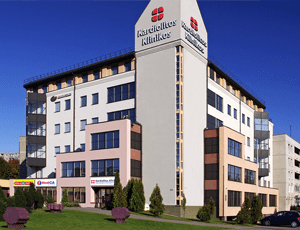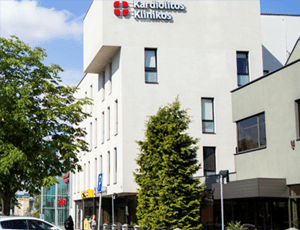The average cost of Trans Urethral Resection of Prostrate (TURP) in Vilnius approximately starts from USD 4000
Treatment cost

Kardiolita Hospital, Vilnius located in Vilnius, Lithuania is accredited by JCI. Also listed below are some of the most prominent infrastructural details:


Apart from in-detail treatment procedures available, Kardiolita Hospital, Kaunas located in Kaunas, Lithuania has a wide variety of facilities available for International Patients. Some of the facilities which are provided by them are Accommodation, Airport Transfer, Choice of Meals. Also listed below are some of the most prominent infrastructural details:
The enlarged prostate gland can become a concern for men after a certain age, leading to difficulties with urination. This issue often prompts medical professionals to recommend transurethral resection of the prostate (TURP) surgery.
The prostate gland undergoes two phases of growth as men age. The initial growth phase occurs during puberty when the gland doubles in size. The second phase of growth typically occurs after the age of 25, reaching its final size, which generally remains constant throughout life. However, in cases of benign prostatic hyperplasia, the prostate gland may further enlarge.
As the gland enlarges, it compresses the urethra, causing the bladder wall to thicken. Over time, the bladder weakens, resulting in incomplete urine emptying and allowing urine to remain in the bladder. Additionally, the narrowing of the urethra exacerbates urinary difficulties, leading to recurring issues with urination.
As of now, it is not totally clear why most men develop BPH but it mainly indicates an imbalance of hormones and sexual activities with advanced age. Apart from that, there can be urinary tract infection, narrowing of the urethra known as urethral stricture, inflammation of the prostate, bladder or stones in the kidney, nerve problems in controlling the bladder, or scarring in the neck of the bladder as a result of previous surgery.
The following are some of the symptoms of BPH:
Some of these above symptoms can occur even in men whose prostate has not enlarged significantly.
Patients are required to stay in the hospital for at least one to two days after the procedure. Patients who undergo TURP are required to have a catheter in place for urine drainage for at least a few days. The catheter is removed when the swelling reduces and the patient is in a position to urinate by himself.
It is normal to experience blood in the urine right after the surgery, pain at the time of urination, and frequent urination after the surgery. However, you must contact the doctor in case you are unable to urinate at all, develop fever, or notice the presence of clots in the urine.
After the surgery, you are required to:
Ask your healthcare adviser for the best multiple options and choose the one that meets your expectations
The minimum cost of Trans Urethral Resection of Prostrate (TURP) in Vilnius is about $4000. In Vilnius, Trans Urethral Resection of Prostrate (TURP) is conducted across many multispecialty hospitals.
The cost of Trans Urethral Resection of Prostrate (TURP) in Vilnius may differ from one medical facility to the other. The top hospitals for Trans Urethral Resection of Prostrate (TURP) in Vilnius covers all the expenses related to the pre-surgery investigations of the candidate. The Trans Urethral Resection of Prostrate (TURP) cost in Vilnius includes the cost of anesthesia, medicines, hospitalization and the surgeon's fee. There are many things that may increase the cost of Trans Urethral Resection of Prostrate (TURP) in Vilnius, including prolonged hospital stay and complications after the procedure.
There are several best hospitals for Trans Urethral Resection of Prostrate (TURP) in Vilnius. Some of the most renowned hospitals for Trans Urethral Resection of Prostrate (TURP) in Vilnius include the following:
The recovery of the patient many vary, depending on several factors. However, on an average, patient is supposed to stay for about 12 days in the country after discharge. This period is important to conduct all the follow-up tests to ensure that the surgery was successful and the patient can go back to the home country.
Vilnius is undoubtedly one of the best cities for Trans Urethral Resection of Prostrate (TURP) in the world. It offers the best medical expertise and good patient experience at an affordable cost. Some of the other top destinations for Trans Urethral Resection of Prostrate (TURP) include the following:
Apart from the Trans Urethral Resection of Prostrate (TURP) cost, the patient may have to pay for additional daily expenses such as for guest house after discharge and meals. These are the chanrges for daily meals and hotel stay outside the hospital. The extra charges may vary from 50 USD.
After the Trans Urethral Resection of Prostrate (TURP) surgery takes place, the average duration of stay at the hospital is about 2 Days. The doctors team review the patient's recovery during this time with the help of blood tests and imaging scans. Once they feel that everything is on track, the patient is discharged.
There are around 1 Hospitals hospitals in Vilnius that offer Trans Urethral Resection of Prostrate (TURP) to international patients. These hospitals are approved to perform the surgery and have proper infrastructure to handle Trans Urethral Resection of Prostrate (TURP) patients. These hospitals comply with all the rules and regulations as dictated by the regulatory bodies and medical association in Vilnius
Some of the most sought after doctors for Trans Urethral Resection of Prostrate (TURP) in Vilnius are: